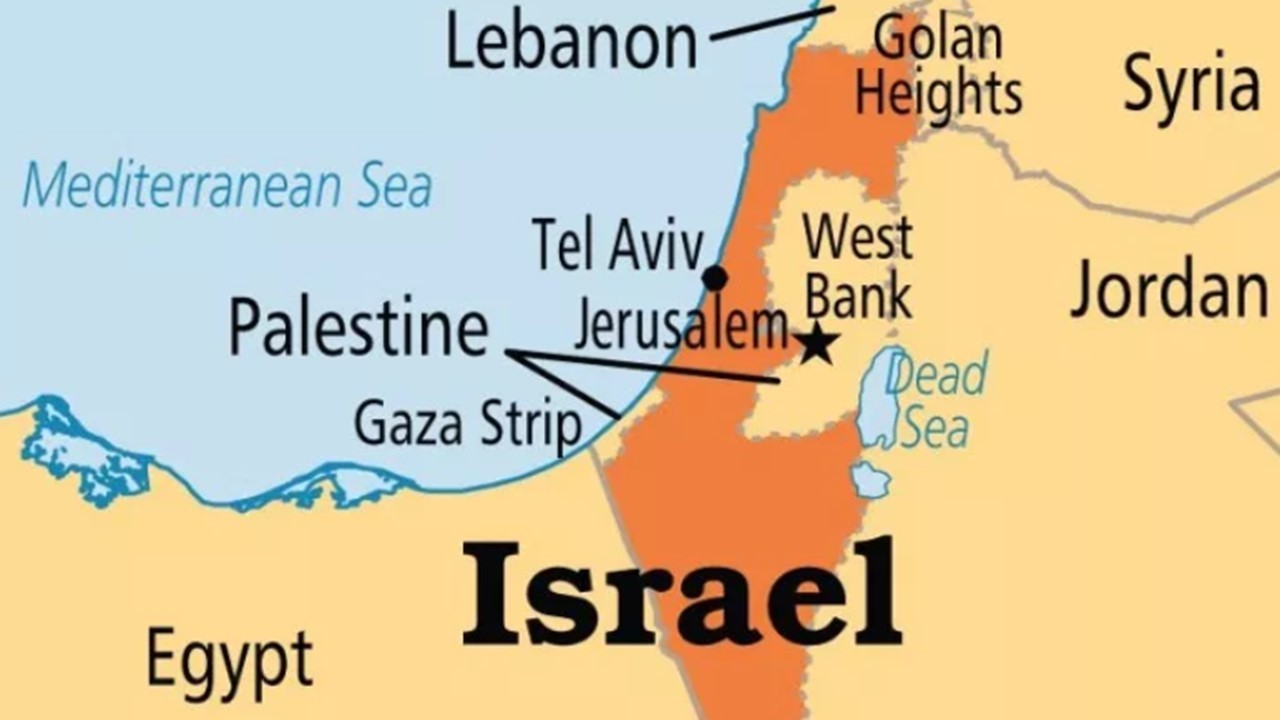From UPSC perspective, the following things are important :
Prelims level: West Asia and arising conflict;
Mains level: Recent Geopolitical issues in news;
Why in the News?
Recently, there are evolving dynamics surrounding Palestinian statehood, including global perspectives, Israeli leadership positions, and the potential implications for the region w.r.t two-state solution.
What are the Global Dynamics and Israeli Opposition towards Palestinian Statehood?
- Global Expectations: Western nations and Arab States are hopeful for Israel to act sensibly amidst the challenging situation in Gaza. The UK and France express readiness to recognize a Palestinian state independently of an agreement with Israel, prompting speculation about US involvement.
- Israeli stance: Israeli PM Benjamin Netanyahu openly opposes a two-state solution and advocates for Israeli control over the entire area west of the Jordan River.
- Netanyahu rejects international pressure and warns against unilateral recognition, citing concerns about terrorism and his political standing.
- Netanyahu’s opposition to a Palestinian state without negotiations reflects his political strategy and the challenges within his ruling coalition.
- Netanyahu’s plan echoes sentiments previously condemned when expressed by Hamas, raising concerns about Israel’s intentions.
Global Response to the Israeli-Palestinian Conflict
- UN Secretary-General’s Call: UN emphasizes the importance of acknowledging Palestinian statehood and condemns the loss of life in Gaza.
- Hearings at ICJ: The International Court of Justice began hearing arguments concerning the legal status of a Palestinian state.
- Mixed Signals: The U.S.’s support for Israel’s security contradicts its calls for a two-state solution, as demonstrated by voting against a UN resolution regarding Israeli settlements. World leaders previously have largely neglected the Palestinian cause during the tenure of former Israeli PM Netanyahu and post-Abraham Accords era.
- Sudden Interest from various Nations: Recently, there has been renewed interest in a two-state solution following Israel’s military actions in Gaza and increasing pressure from international bodies. The U.S. too have imposed sanctions on individual settlers rather than addressing broader issues related to settlements and violence.
- Domestic Pressures: King Abdullah II of Jordan, along with Egypt, France, and Germany, issued a joint statement opposing Israel’s annexation plans. The U.S., EU, and Arab States face mounting pressure to address the crisis, hoping for positive changes within Israel’s leadership.
- Saudi Demand: Saudi Arabia demands an immediate peace process for a Palestinian state before resuming normalization talks with Israel.
- Threatening Proposal: Israel’s latest plan suggests dissolving the UN Relief and Works Agency for Palestine Refugees in the Near East (UNRWA), which would compromise the two-state solution
| BEYOND EDITORIAL:
What are Abraham Accords?
How Abraham Accords have influenced the Israeli-Palestinian conflict? Despite not directly involving parties in active conflict, the Abraham Accords have influenced the broader context in several ways:
Critical Analysis of Accords towards the dynamics of the Israeli-Palestinian conflict:
|
What is the feasibility of a Single-State Solution?
If the two-state solution fails given recent developments and Israeli leadership positions, then:
- Equal Rights: In a single-state scenario, Israel must provide equal rights to Palestinians in the West Bank and Gaza to remain a democracy. Providing equal rights would reduce the percentage of Jews below 50%, challenging Israel’s identity as a Jewish state.
- Apartheid or Ethnic Cleansing: Without equal rights, Palestinians risk becoming second-class citizens, resulting in either apartheid or ethnic cleansing.
- Preservation of Status Quo: Continuing the present conditions would perpetuate the occupation and deny Palestinians self-determination.
- Driving Out Palestinians: An alternative to providing equal rights might involve expelling Palestinians from the West Bank, Gaza, and East Jerusalem.
- Decline of Support: Increasingly, Israelis have distanced themselves from developments in the Occupied Territories, reducing support for a two-state solution.
- Rise of Right Wing: The growth of right-wing parties in Israel has led to the demise of groups supporting the Oslo Accords.
- Shifting Attitudes: Following attacks by Hamas, support for a two-state solution has dwindled, leaving Israelis questioning whether Palestinians truly desire peace.
- Recognition of Two-State Solution: Even Hamas once acknowledged a two-state solution based on 1967 borders, although this position has weakened over time.
How can be the ‘Afghan Model’ solution towards this issue?
The Afghan model refers to the acceptance of the Taliban’s return to power despite reservations. As the world grapples with the Israeli-Palestinian conflict, comparisons have emerged between the Taliban’s ascension in Afghanistan and potential shifts in Hamas’ role in Palestine.
- Similarity between both cases: Both sides require transformative leadership changes. Israel needs to embrace a two-state solution, and Palestine requires an inclusive and representative leadership encompassing Gaza and the West Bank.
What are the Challenges and Implications if Afghan model is applied?
- Political stance: Centrist Israeli politicians have lost popularity due to their perceived inaction on the Palestinian issue. In short, replacing them as champions of a two-state solution is challenging.
- Hamas’ inclusion in Palestinian governance structures would necessitate significant ideological shifts and concessions, which may prove difficult.
- The international community’s reluctant approach to the two-state solution raises questions about their commitment to promoting meaningful change in the Middle East.
Conclusion:
The ‘Afghan model,’ while imperfect, offers insights into the possibilities and limitations of accommodating hard-line forces within mainstream political processes. Ultimately, the success of such efforts depends upon the ability of all stakeholders—including Israel, Palestine, and the international community to overcome deeply ingrained mistrust and pursue genuine reconciliation.
Prelims PYQs:
- The term “two-state solution” is sometimes mentioned in the news in the context of the affairs of (UPSC CSE 2018)
- China
- Israel
- Iraq
- Yemen
Mains PYQs:
Too little cash, too much politics, leaves UNESCO fighting for life.’ Discuss the statement in the light of US’ withdrawal and its accusation of the cultural body as being ‘anti-Israel bias’ (UPSC CSE 2019)
Get an IAS/IPS ranker as your 1: 1 personal mentor for UPSC 2024

